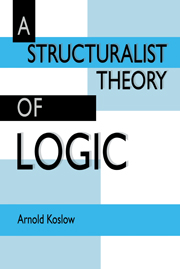Book contents
- Frontmatter
- Contents
- Preface
- Part I Background
- 1 Introduction
- 2 The program and its roots
- 3 Introduction and Elimination conditions in a general setting
- 4 The Belnap program
- Part II Implication relations
- Part III The logical operators
- Part IV The modal operators
- Appendix A An implication relation for the integers in the programming language BASIC
- Appendix B Symmetric sequents as products of implication relations and their duals
- Appendix C Component-style logical operators and relevance
- Notes
- Bibliography
- Index
- Frontmatter
- Contents
- Preface
- Part I Background
- 1 Introduction
- 2 The program and its roots
- 3 Introduction and Elimination conditions in a general setting
- 4 The Belnap program
- Part II Implication relations
- Part III The logical operators
- Part IV The modal operators
- Appendix A An implication relation for the integers in the programming language BASIC
- Appendix B Symmetric sequents as products of implication relations and their duals
- Appendix C Component-style logical operators and relevance
- Notes
- Bibliography
- Index
Summary
Another program for understanding the logical operators is due to N. D. Belnap, Jr. It is similar to that of Gentzen and our own, in that it involves a division of labor: a background theory of implication that is structural, and a theory of the operators characterized against that background.
In a witty and elegant essay, Belnap developed a view about the significance of the logical connectives that stressed the role of the connectives with respect to inference. Belnap's theory clearly has the Gentzen style: A general theory of inference (which he calls “deducibility”) is set forth. As he remarked, it makes no difference whether one chooses to use a syntactic notion of deducibility or a semantic concept of logical consequence to represent what he intended by “inference.” Against the theory of inference, a theory of the logical connectives is developed as an extension of the theory of inference. The meaning of a connective like “and” is, according to Belnap, given by its role in inference. Although the strategy of explanation is Gentzenesque, the resultant theory is somewhat different in detail from Gentzen's, and very different from our own use of the Gentzen framework.
Belnap's remarks were designed to answer a probing challenge by A. N. Prior to the claim that “the complete answer” to the question of what is the meaning or the definition of the logical particle “and” could be given by describing the role that “and” plays in a class of inferences that Prior called “analytic.”
- Type
- Chapter
- Information
- A Structuralist Theory of Logic , pp. 26 - 32Publisher: Cambridge University PressPrint publication year: 1992



